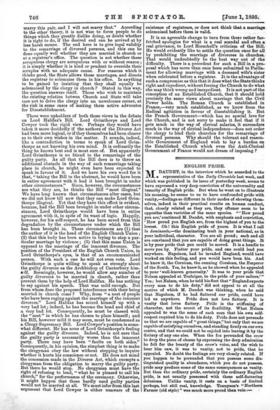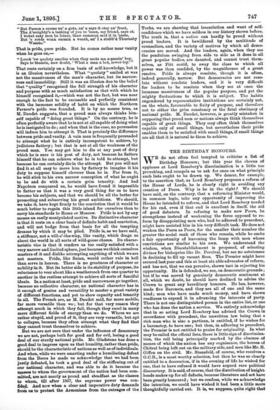ENGLISH PRIDE.
MDAUDET, in the interview which he accorded to the • representative of the Daily Chronicle last week, and which was published in its issue of yesterday week, seems to have expressed a very deep conviction of the universality and tenacity of English pride. But when he went on to illustrate his meaning, he seems to us to have confounded pride with vanity,—feelings so different in their modes of showing them- selves, indeed in their practical results on human conduct, that, closely related as they are, they oftener seem to be opposites than varieties of the same species. "'How proud you are,' continued M. Daudet, with emphasis and conviction, How proud you English are, from the highest of you to the lowest. Oh ! this English pride of yours. It is what I call la dominante,—the dominating trait in your national, as in your individual, character. You are all proud ; each and all are convinced that you are capable of doing great things. It is by your pride that you could be moved. It is a handle to move you by. Flatter your pride, and one could lead you anywhere. Napoleon, had he invaded England, would have worked on this feeling, and you would have been his. And he knew it, the Corsican, the cunning Corsican, the Emperor of the South. Yes, he knew it, as he showed when he appealed to your well-known generosity.' It was to your pride that Nelson appealed at Trafalgar, to the pride of your sailors." Yes ; but Nelson, when he told his fleet that "England expects every man to do his duty," did not appeal to at all the motive of which M. Daudet was thinking, when he said that Napoleon, if he had flattered our pride, could have led us anywhere. Pride does not love flattery. It is vanity that loves flattery. Pride is the stiffening of character, not the secret of its flexibility. What Nelson appealed to was the sense of each man that his own self. respect required him to do his duty. Pride does not persuade us that we are capable of "great things," but only that we are capable of satisfying ourselves, and standing firmly on our own centre, and that we could not be cajoled into leaving it by the flattery of any one else. When the fox persuaded the crow to drop the piece of cheese by expressing the deep admiration he felt for the beauty of the crow's voice, and the wish to hear him caw, it was to vanity, not to pride, that he appealed. No doubt the feelings are very closely related. If you happen to be persuaded that you possess some dis- tinguished quality in abundance, which you do not possess, pride may produce some of the same consequences as vanity. But then the ordinary pride, certainly the ordinary English pride, is not usually possessed with these self-flattering delusions. Unlike vanity, it rests on a basis of limited perhaps, but still real, knowledge. Tennyson's "Northern Farmer (old style)" was much more proud than vain :-- "But Parson a warns an' a goes, an' a says it easy an' frees, The A'moighty's a taking of you to 'issen, my friend, says ea. I weant saay men be loiars, thaw summun said it in 'taste, But 'e reads wonn sarmin a weeak, an' I a stubb'd Thurnaby
Waaste."
That is pride, pare pride. But he comes rather near vanity when he goes on,—
" ',Gook 'ow quoloty smoiles when they seeds ma a-passin' boy, Says to thessen, naw doubt, ' What a man a belt, sewer-loy.'" That rests certainly on a firm basis of self-knowledge, but it is an illusion nevertheless. What " qnoloty " smiled at was not the massiveness of the man's character, but its narrow- ness and immobility. Still it was an illusion due to the belief that " quality " recognised the full strength of his character and purpose with as much satisfaction as that with which he himself recognised it,—which was not the fact, but was near enough to the fact to be excusable and perfectly consistent with the immense solidity of habit on which the Northern Farmer's pride was founded. It is by no means true, as M. Daudet suggests, that a proud man always thinks him-
self capable of "doing great things." On the contrary, he is often perfectly aware that he is not at all capable of doing what he is instigated to do ; and when that is the case, no persuasion will induce him to attempt it. That is precisely the difference between pride and vanity. A vain man is frequently persuaded to attempt what he is entirely incompetent to achieve, by judicious flattery ; but that is not at all the weakness of the proud man You may get him to die at any post of duty which he is sure is his post of duty, not because he flatters himself that he can achieve what he is told to attempt, but because he can certainly die in the attempt. But you will not find it at all easy to move him by flattery to imagine it his duty to suppose himself cleverer than he is. Far from it, he will stick to his own narrow conception of what he ought to be and do with a certain grim tenacity. And had Napoleon conquered us, he would have found it impossible to flatter us that it was a very good thing for us to have become his subjects, and that we should be all the better for promoting and subserving his great ambitions. We should, we take it, have kept firmly to the conviction that it would be much better to regain this little island for ourselves than to carry his standards to Rome or Moscow. Pride is not by any means an easily manipulated motive. Its distinctive character is that it rests on a clear basis of definite habit and conviction, and will not budge from that basis for all the tempting
dreams by which it may be plied. Pride is, as we have said, a stiffener, not a will-o'-the-wisp, like vanity, which drags us about the world in all sorts of wild-goose chases. Its charac- teristic vice is that it renders us too easily satisfied with a very narrow and limited sphere, just because we think ourselves masters of it and dislike attempting anything of which we are
not masters. Pride, like Satan, would rather rule in hell than serve in heaven. There is no greatness of character or nobility in it. But its better side is its stability of purpose, its reluctance to veer about like a weathercock from one quarter to another in the restless attempt to achieve all sorts of fanciful ideals. In a nation at least, pride and narrowness go together, because no collective character, no national character has in it enough of genius and versatility to master a great variety of different functions, and yet to show capacity and tenacity in alL The French are, as M. Daudet said, far more mobile, far more versatile than we ; but for that very reason they attempt much in which they fail, though they excel in many more different fields of energy than we do. Where we are rather stupid, and proud of it, they are very versatile, but apt to collapse, because they often attempt what they find that they cannot trust themselves to achieve.
But we are not sure that under the influence of democracy we are not, perhaps both for good and for evil, losing a good deal of our sturdy national pride. Mr. Gladstone has done a good deal to impress upon us that humility, rather than pride, should be the characteristic of nations as well as of individuals.
And when, while we were smarting under a humiliating defeat from the Boers he made us acknowledge that we had been
justly defeated, he took a good deal of the stiffening out of
our national character, and was able to do it because the masses to whom the government of the nation had been com-
mitted, are not nearly as proud and steadfast as the classes to whom, till after 1867, the supreme power was con- fided. And now when a clear and imperative duty demands froM us to protect the Armenians from the outrages of the Turks, we are showing that irresolution and want of self- confidence which we have seldom in our history shown before. The truth is, that a nation can hardly be proud without proud leaders. It is bewildered by the multitude of counsellors, and the variety of motives by which all demo- cracies are moved. And the leaders, again, when they see the pendulum swinging from side to side as it does in all great popular bodies, are daunted, and cannot trust them- selves, as Pitt could, to sway the class to which all power was then confided, by the magnificence of a great resolve. Pride is always resolute, though it is often, indeed generally, narrow. But democracies are not reso- lute without resolute leaders, and it is very difficult for leaders to be resolute when they see at once the immense massiveness of the popular purpose, and yet the mighty fluctuations to which it is subject. The habits engendered by representative institutions are certainly not, on the whole, favourable to fixity of purpose, and therefore not to either the grim constancy or the fatal obstinacy of national pride. M. Daudet, however, is greatly mistaken in supposing that proud men or nations always think themselves capable of great things. They may often think themselves capable only of small things, but nevertheless their pride enables them to be satisfied with small things, if small things are all that it is natural to them to achieve.







































 Previous page
Previous page